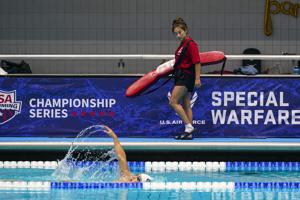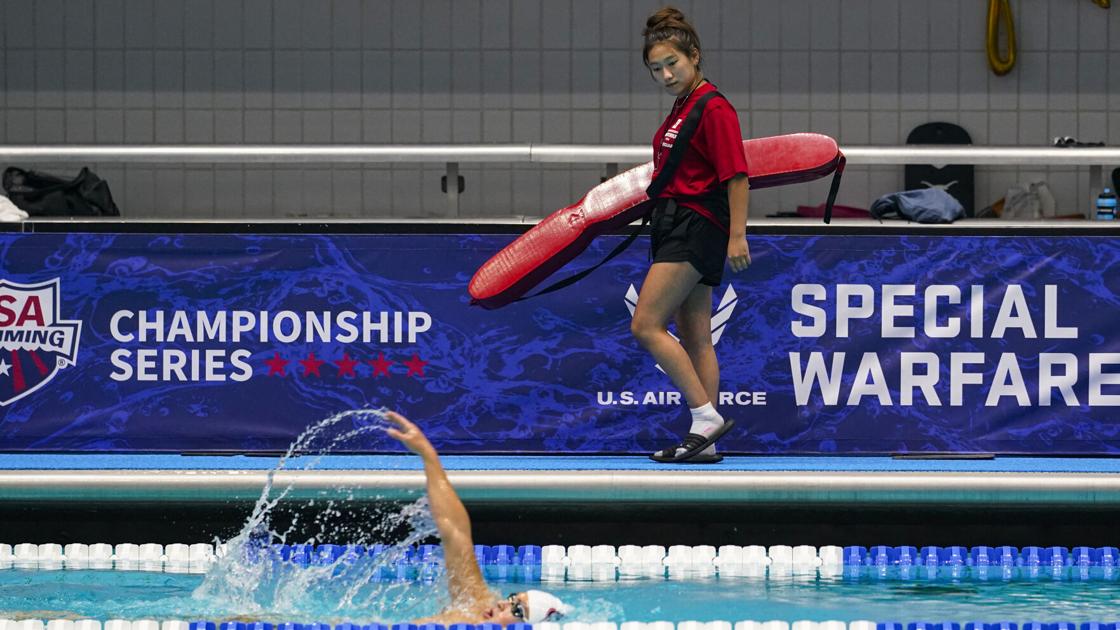Column: A salute to lifeguards, who are even needed at the Olympic pool

INDIANAPOLIS — You’ve probably seen the meme of the bored-looking lifeguard sitting next to a pool.
“If you ever feel useless,” it goes, “just remember that someone is a lifeguard at the Olympics swimming event.”
Funny stuff, but hardly a joking matter.
Lifeguards are stationed around the pool at every major swimming competition — including this week’s U.S. national championships meet in Indianapolis, which features Olympic champions such as Katie Ledecky and Caeleb Dressel.
Everyone competing at the IU Natatorium is sure glad to have ’em.
“I’ve seen them pull people out several times,” said breaststroker and Indiana native Lilly King, whose haul of five Olympic medals includes a pair of golds. “I saw a kid crack his head open on the wall here when I was a kid.”
People are also reading…
Even so, it must seem downright ludicrous to the casual swimming fan to have lifeguards at a meet of this caliber.
Why would some of the world’s finest-conditioned athletes need these mostly high school and college kids hovering at the edge of the pool — clinging to red rescue belts, their eyes darting back and forth, primarily tasked with making sure no one drowns?
“It is funny when you think about it,” said former world-record holder Regan Smith. “Its not like any of us are not able to tread water and things like that.
“But accidents happen all the time,” she said, quickly changing the meme narrative. “I think the second that people are, like, getting cocky and it’s like, ‘Oh, we don’t need lifeguards here,’ that’s when a freak accident happens. So, I’ll always take the stand that you can never be too careful. I’m glad they’re here. I don’t know how to do CPR. They do.”
Potential hazards lurk with every stroke, particularly in the crowded practice pools where collisions and other mishaps are common at meets featuring hundreds of swimmers.
“This morning I got kicked in the mouth,” said Olympic backstroke champion Ryan Murphy.
Matt Kovacs, who oversees the lifeguard staff at the natatorium, has seen it all. At a Grand Prix meet last year, the lifeguards jumped in when a swimmer popped his shoulder out of socket during a race. Just this week, a swimmer broke off two of her nails when she slapped the wall at the finish.
“Things happen,” Kovacs said. “It’s better for us to be around and be ready.”
During the U.S. nationals, which are deciding the team for next month’s world championships in Fukuoka, Japan, lifeguards are stationed around the main pool and the two practice areas.
They rotate to different stations every 20 minutes, are trained to both sit and stand to help maintain their focus, and get a 20-minute break after every hour on the job to refresh their attentiveness.
They clearly take their very serious jobs very seriously, never seeming to take their eyes off the water, though it’s not unusual to catch a bit of grief about staffing a meet with world-class swimmers.
Nathan Ludwig, a lifeguard supervisor who has worked at the aquatics center on the IUPUI campus for 3 1/2 years, told family and friends about this week’s assignment.
Their reply? “Nathan, do you really need to lifeguard that?”
And a lot more like him are needed.
Park departments around the country are facing major staffing shortages at their public pools and water parks. That’s where highly skilled lifesavers do their best work.
“I worked at a water park for many years,” Kovacs said. “I would have about 30 saves a summer. Most of them minor, but if I didn’t save them it would’ve become a whole lot worse.”
A growing dearth of lifeguards was only exacerbated by the COVID-19 pandemic. When pools reopened, many of those trained to save lives didn’t return to their jobs. Fewer and fewer people seemed willing to take on such a momentous responsibility.
Philadelphia was so desperate to find potential lifeguards for its 70-plus public pools it offered $1,000 bonuses — even to those who didn’t know how to swim but were willing to go through the training needed to pass the certification.
Los Angeles acknowledged that it was struggling to fill positions for what was once a coveted summer post, with country supervisors complaining that higher-paying jobs requiring less training were luring away potential candidates.
In Indianapolis, which has hosted some of the country’s biggest meets and will be the site of next year’s U.S. Olympic trials, the parks department resorted to doling out bonuses of up to $500 to bring in more candidates. A year ago, the city was able to open just six of its 19 public aquatic facilities, though it’s more this summer.
Murphy has a special appreciation for lifeguards through his work with Goldfish Swim School, which teaches children as young as 4 months old how to stay afloat.
“If we don’t have lifeguards on the deck, no lessons can happen,” Murphy said. “It’s one of those things where you hope they never have to do anything, but you need them there in case they have to.”
Good training is the key to making sure lifeguards recognize those rare signs of trouble during top-level competitions.
At last year’s world aquatics championships in Budapest, Hungary, lifeguards failed to jump in when U.S. artistic swimmer Anita Alvarez sank motionless to the bottom of the pool, having fainted during a grueling solo routine.
Her coach, Andrea Fuentes, leaped in to save her after those who should’ve done it froze at the very moment they were needed most.
At the IU Natatorium, lifeguard candidates must be about to swim 200 yards, tread for 2 minutes with their hands out of the water, and retrieve a brick from the bottom of the 18-foot-deep diving well. They’re also certified in CPR, as well as the use of automated external defibrillators and oxygen tanks.
“Anything you would need around a pool,” Kovacs said. “We are very particular in our training, making sure we are at that top level, ready for anything to happen.”
Retired Olympic champion Cullen Jones was asked about that meme, the one that claims lifeguards are so unnecessary at a meet like the Olympics.
“It is not worthless at the Olympics to have lifeguards. Anything can happen. You can cramp up, God forbid,” Jones said. “So it’s not the most worthless job.
“But at the same time,” he quickly added, breaking into a big grin, “that meme was hilarious.”
Lifeguards will remain the butt of jokes around the Olympic pool.
For all the latest Sports News Click Here
For the latest news and updates, follow us on Google News.

